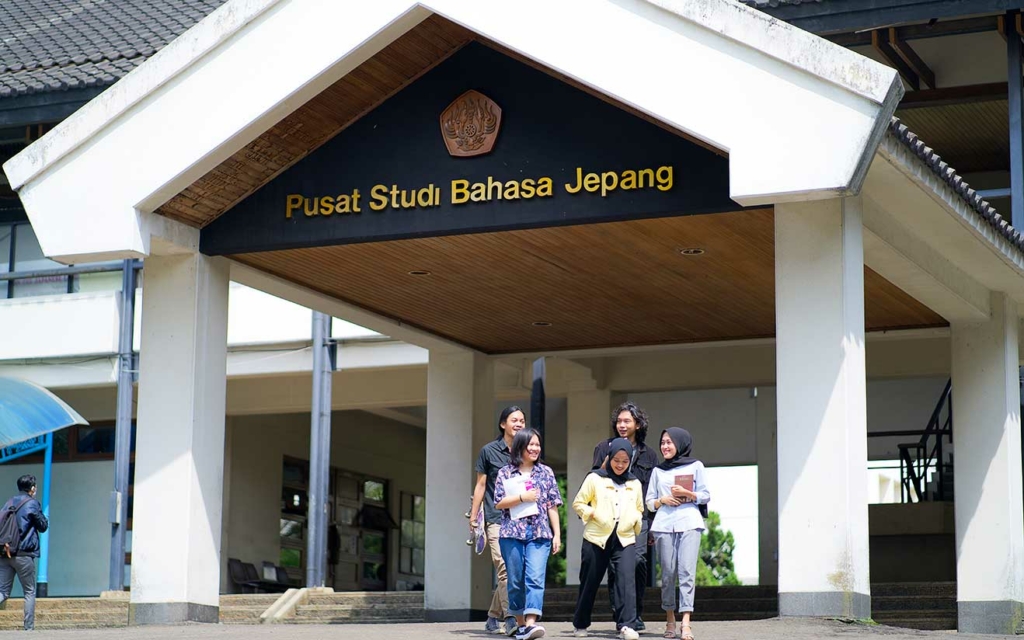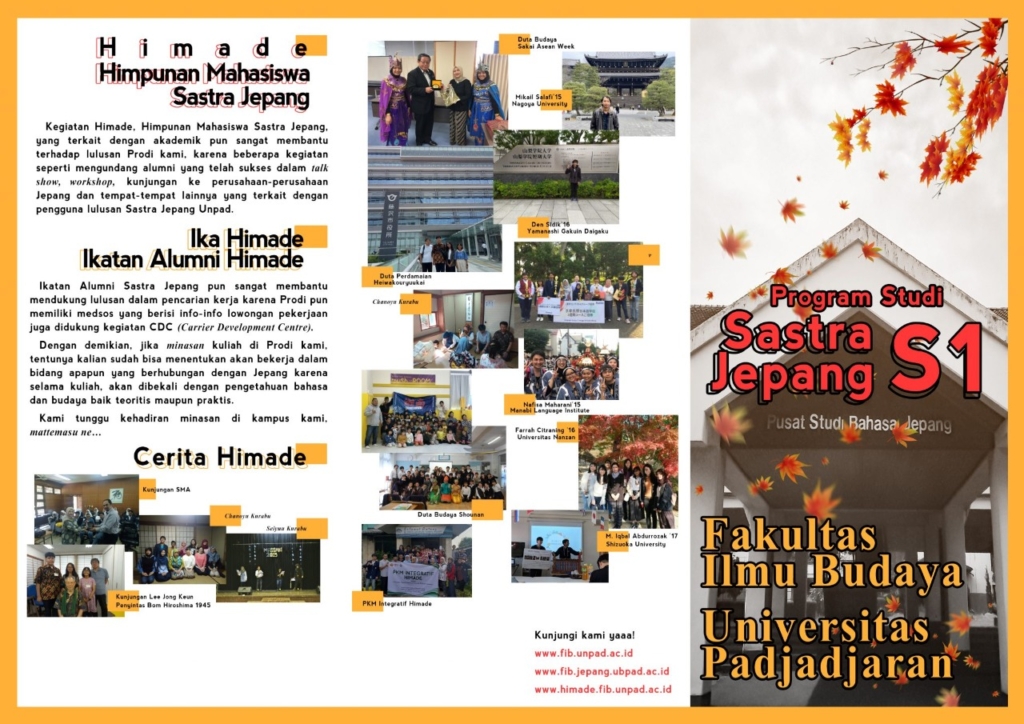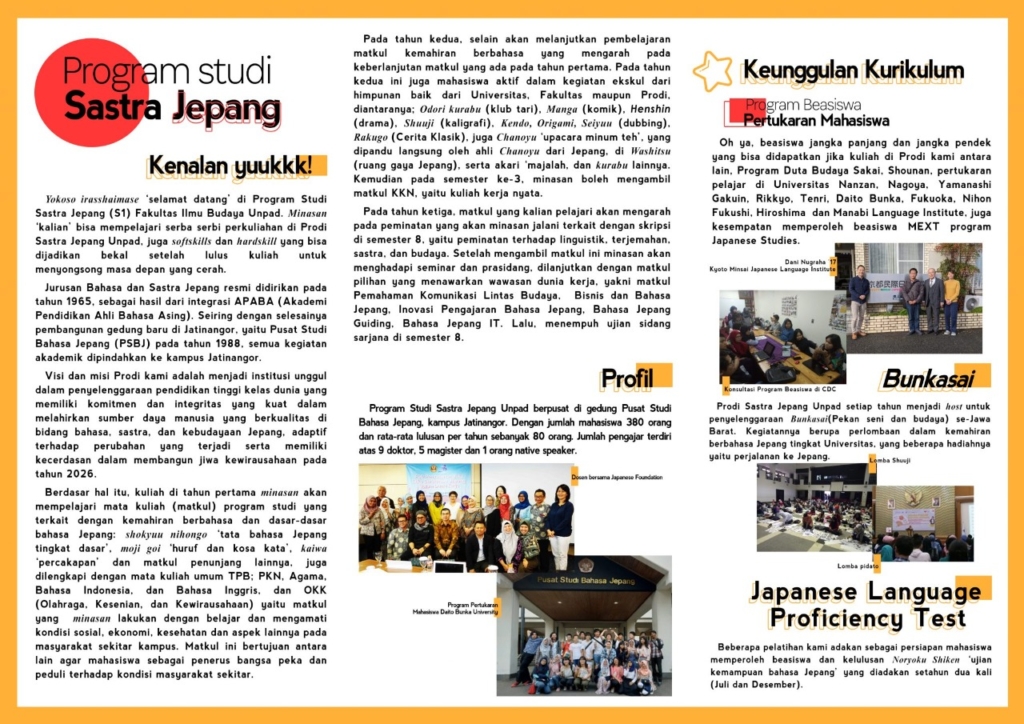Universitas Padjadjaran’s Faculty of Cultural Sciences offers an undergraduate study program in Japanese Studies. Graduates of this program will attain the Sarjana Humaniora (S.Hum.) title. The program has received the highest accreditation from BAN-PT, the national body of higher education accreditation in Indonesia, with a grade of A. The duration of the study is 8 semesters. The program is taught at the Jatinangor Campus in Sumedang.

Unpad’s Japanese Studies program have stood since 1963, making it the first Japanese studies program in Indonesia. The program has gone by various names during its time, such as East Asian Studies, Japanese Language and Literature, Japanese Literature, and Japanese Language and Culture.
By 2026, the Japanese Studies program aims to excel as a world-class higher education institution, committed to producing high quality human resources in the fields of Japanese language, literature, and culture, as well as to adapt wisely to changes and to build strong entrepreneurial spirits.
The Japanese Studies program also possesses its own specialized university building, the Japanese Language Study Center (Pusat Studi Bahasa Jepang, or PSBJ), granted to the Faculty by the Japanese government through the Japan International Cooperation Agency (JICA) in 1987.
Curriculum
The Japanese Studies program at Universitas Padjadjaran strives to achieve the following 5 learning outcomes:
A. Responsibility
- Be able to develop and apply the sciences of linguistics, literature, culture, and translation for the advancement of humanity;
- Be able to design and research using sound theoretical and methodological knowledge, as well as to analyze and interpret data;
- Be able to identify, map out, and solve issues regarding the development of language, literature, culture, and translation;
- Be able to adapt to various professional environments and to work in multidisciplinary teams in a conducive atmosphere.
B. Attitude
- Remain faithful to God and can display piety;
- Uphold the values of human rights in carrying out religious, moral, or ethical tasks;
- Contribute to the advancement of the quality of life, and of the citizens of Indonesia based on the principles of Pancasila;
- Contribute as a citizen of Indonesia with pride, love, and nationalism for Indonesia, as well as responsibility towards the nation and its people;
- Value the diversity of culture, ideologies, religions, beliefs, and other original findings or thought;
- Collaborate alongside the general public supported by social awareness and compassion;
- Observe local laws and customs as part of society and nation;
- Internalize the values of academic norms and ethics;
- Display responsibility for one’s own work in their field;
- Internalize the values of independence and entrepreneurship.
C. General Abilities
- Able to personally develop based on good foundational understanding of religion, Pancasila, civic studies, Indonesian language, English language, philosophy, and the current situation of the Indonesian people;
- Mampu membuat perencanaan usaha dan menjalankan kewirausahaan dengan kreatif/ Adept at planning and executing creative entrepreneurial projects;
- Adept in working in tourism either locally, nationally, or internationally;
- Able to comprehend well the culture of Indonesia to build an appreciation for cultural diversity.
D. Specific Abilities
- Fluent in using Japanese for business communication;
- Fluent in using Japanese for tourism purposes;
- Adept at applying Japanese language teaching methodologies;
- Adept at understanding cultural diversity;
- Able to operate technological instruments using Japanese.
E. Competencies
- Mampu mengekspresikan ide-ide dan tema-tema tertentu yang berkaitan dengan bidang ilmu yang ditekuninya. Yaitu memiliki kapasitas dan kemampuan berkomunikasi secara aktif, lisan dan tulisan (Kemampuan gramatika setara dengan N3/N2)/ Able to express certain ideas and themes related to a student’s field of study with the capacity to communicate actively, both in writing or speech (equivalent to an N3 or N2 proficiency);
- Be well-versed and understand the concepts of literature, linguistics, culture, and/or translation;
- Able to conduct practical pragmatic analysis on topics related to one’s specialization (literature, linguistics, culture, and/or translation).
Career Prospects
Graduates of the Japanese Studies program have found success working in:
- Government: Staff at governmental institutions (ministries, departments, etc.);
- Tourism: Tour guide, hospitality business owner and/or worker:
- Translation, interpreting, hosting, journalism, editing
- Entrepreneurship
Collaborations
The Japanese Studies program conducts active efforts of collaboration such as:
- Partnership for long-term and short-term scholarships with many Japanese higher education and governmental institutions.
- Collaborating with organizations revolving around Japanese academics, such as alumni organizations, and associations of Japanese Studies programs in Indonesia.
- Working with The Japan Foundation in continually holding national and international seminars, as well as Japanese language proficiency tests (Nouryoku Shiken).
- Working together with PT OS services Indonesia, NIKKEI Recruitment in scouting recruits from Japanese Studies graduates for national and international businesses since 2013.*


Website: https://jepang.fib.unpad.ac.id